Credit Cards vs. Debit Cards: Understanding the Key Differences

In today's financial landscape, understanding the differences between debit and credit cards is crucial. Many consumers find themselves puzzled when deciding which card to use for their transactions, and each option comes with its unique set of features, advantages, and drawbacks.
This article aims to clarify these differences by delving into both card types, explaining their functionalities, and highlighting scenarios where one may be preferred over the other.
What is a Debit Card?

A debit card is a financial instrument that allows you to access funds in your bank account and make purchases or withdraw cash. Unlike credit cards, debit cards are directly linked to your checking account, meaning that when you make a transaction, the money is instantly withdrawn from your account.
What is a Credit Card?

A credit card is a type of loan that allows consumers to borrow money up to a certain limit to make purchases. Unlike debit cards, when you use a credit card, you aren’t spending your own money right away; instead, you are borrowing money from the credit card company. Credit cards also require repayment, typically on a monthly basis, and can incur interest if not paid off in full.
Key Differences Between Credit and Debit Cards

Understanding the key differences between debit and credit cards is essential for making an informed choice about how to manage your finances. While both cards serve the fundamental purpose of facilitating transactions, they come with distinct implications for spending, debt, and financial management.
This section explores the primary factors that differentiate debit and credit cards, making it easier for users to select the right card based on their needs.
1. Source of Funds
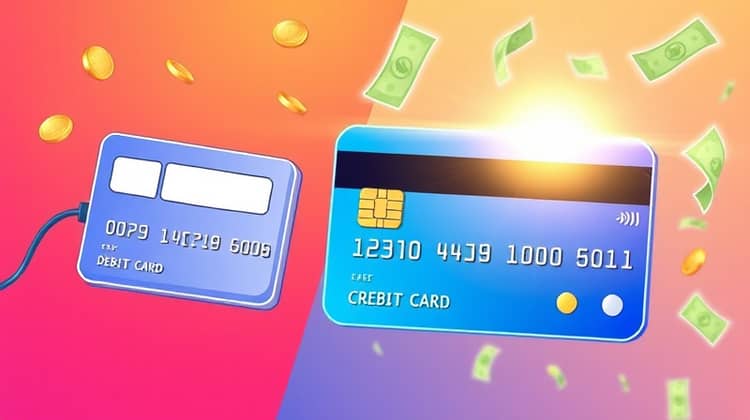
The fundamental difference between debit and credit cards lies in their source of funds.
- Debit cards access funds from your bank account.
- Credit cards allow borrowing up to a predetermined limit.
This means that with a debit card, you can only spend what you have, while with a credit card, you can spend beyond your available cash, taking on debt that needs to be repaid.
2. Impact on Credit

Using credit cards can have a significant impact on your credit score, as they are a factor in determining your creditworthiness. Responsible use of credit cards, such as making timely payments and keeping balances low relative to credit limits, can enhance your credit score.
On the other hand, debit cards do not directly affect your credit score, as they do not involve borrowing or repayment of debt. While they help manage spending, they do not build your credit history.
3. Fees and Interest
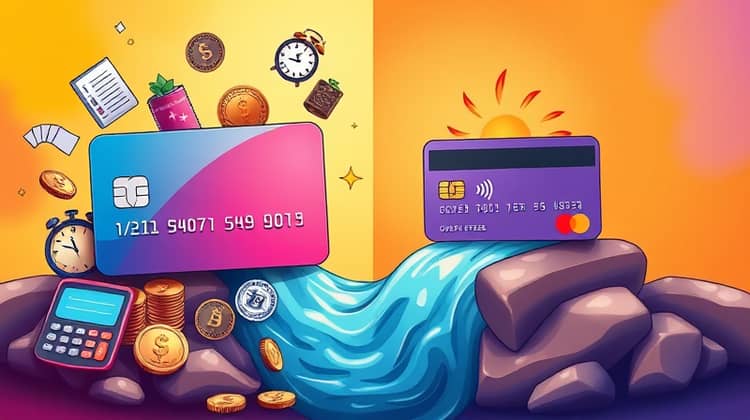
When comparing fees and interest rates, credit cards often have annual fees, late payment penalties, and high-interest rates for any outstanding balances. This can lead to significant costs for consumers who carry a balance month to month.
Debit cards typically do not have interest associated with them because they draw directly from available funds; however, it is essential to be aware of potential overdraft fees.
- Credit cards may charge interest if the balance is not paid in full each month.
- Debit cards may incur overdraft fees if you spend more than your account balance.
Understanding these costs is essential for budgeting and managing personal finances effectively.
4. Rewards and Benefits
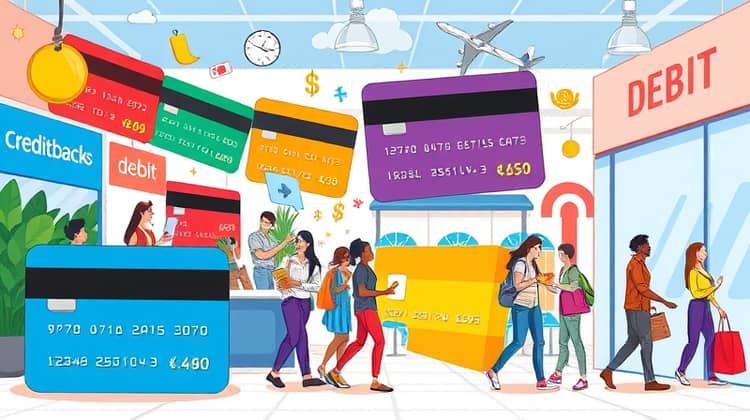
Many credit cards come with various rewards programs, offering points, cashback, travel benefits, and other perks. These rewards can provide additional value for cardholders who use their credit cards frequently and responsibly.
Conversely, debit cards usually offer limited or no rewards, as they are more straightforward financial tools designed for direct access to funds rather than incentivizing spending.
- Credit cards might offer cashback on purchases.
- Credit cards can provide travel rewards and benefits.
- Credit cards might include purchase protection.
As such, individuals looking to take advantage of rewards may prefer using credit cards for their everyday purchases.
5. Security
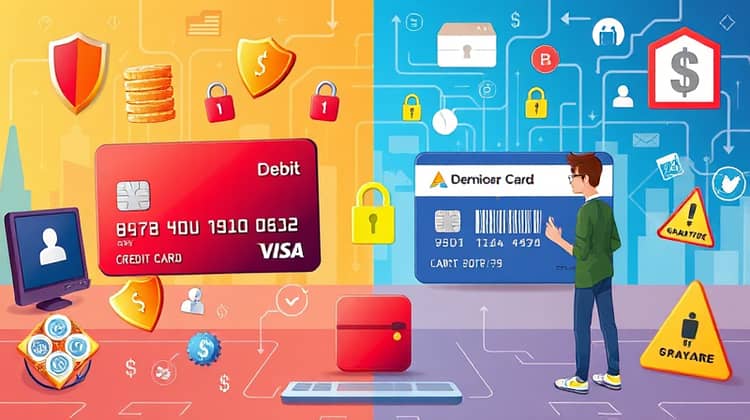
When it comes to security, credit cards generally offer more robust protections against fraud and identity theft. If a fraudulent charge appears on your statement, you typically are not liable if you report it promptly and meet other criteria enforced by the card issuer.
Debit cards, while having some security features, can expose your bank account directly to hackers or identity thieves. If someone gains access to your debit card information, they may drain your bank account before you even notice the unauthorized transaction.
6. Usage and Acceptance

Both debit and credit cards are widely accepted for various transactions, but there are still some differences in their usage. Generally, credit cards are accepted universally, even for reservations or transactions requiring a hold on funds.
Debit cards may be accepted everywhere but can be problematic in some situations where credit holds or large sums are involved, such as hotel reservations or rental cars.
7. Overdraft and Credit Limits
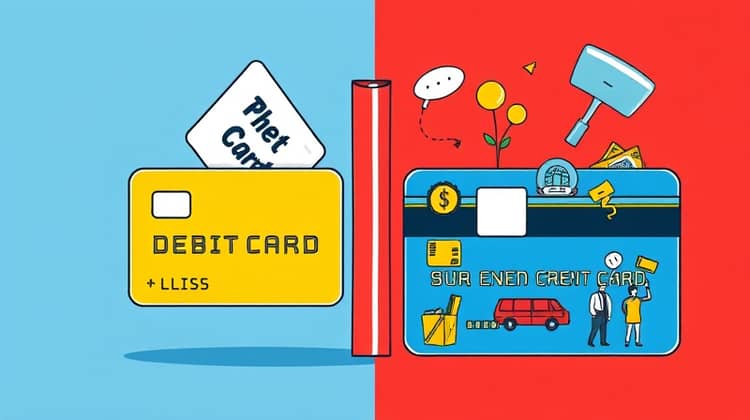
Debit cards do not allow for overdraft protection unless explicitly linked to an overdraft account. Thus, spending is limited to the amount in your account. If you attempt to spend more, the transaction may be declined or can incur overdraft fees depending on your bank's policy.
Credit cards, on the other hand, come with a credit limit which allows for borrowing. This can provide flexibility in managing unexpected expenses but also can lead to debt if not handled responsibly.
When to Use a Debit Card

Using a debit card is suitable in several situations, particularly if you want to control your spending or avoid debt. Debit cards are excellent for everyday purchases, allowing you to pay for groceries, gas, or dining without the risk of accruing debt or interest.
Additionally, using a debit card can be beneficial when you need quick access to your funds or when you want to ensure that you don’t overspend.
- For everyday shopping where you want to stick to your budget.
- When you want to avoid accumulating debt by using your own funds.
- For cash withdrawals from ATMs without incurring high-interest rates.
These scenarios illustrate the practicality of debit cards for consumers looking to maintain a solid financial footing without risking debt.
When to Use a Credit Card

Credit cards can be used strategically in several scenarios where benefits or rewards can be maximized. They are advantageous for larger purchases, such as travel or electronics, due to the rewards points and consumer protection they can offer.
Moreover, credit cards are appropriate when making reservations or bookings that may require holds on your credit card.
- When you need to build or maintain your credit score.
- For major purchases to take advantage of rewards and consumer protections.
- In situations requiring a credit hold like hotel or car rentals.
Utilizing credit cards wisely can enhance financial flexibility while also building credit history.
Conclusion

In conclusion, understanding the differences between debit and credit cards is essential for effective financial management. Each card type has its own distinct features, benefits, and potential drawbacks that can impact your spending habits and financial health.
By assessing your personal needs and financial goals, you can make informed decisions about which card to use in different situations, ensuring that your financial practices align with your objectives.






